英国大宪章历史渊源
- 格式:docx
- 大小:23.90 KB
- 文档页数:5
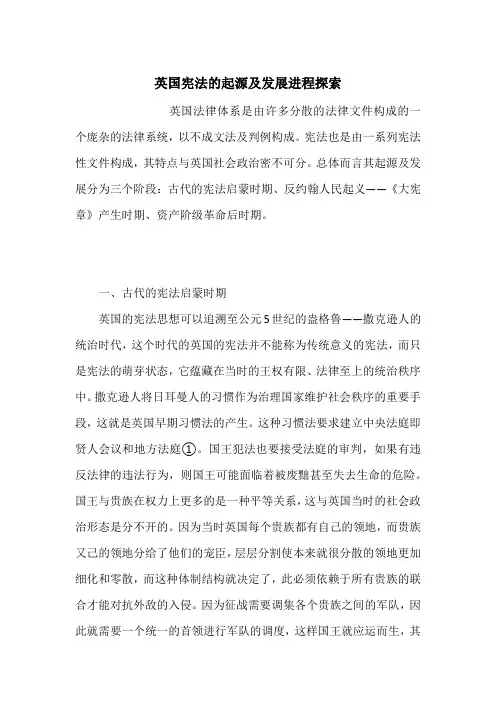
英国宪法的起源及发展进程探索英国法律体系是由许多分散的法律文件构成的一个庞杂的法律系统,以不成文法及判例构成。
宪法也是由一系列宪法性文件构成,其特点与英国社会政治密不可分。
总体而言其起源及发展分为三个阶段:古代的宪法启蒙时期、反约翰人民起义——《大宪章》产生时期、资产阶级革命后时期。
一、古代的宪法启蒙时期英国的宪法思想可以追溯至公元5世纪的盎格鲁——撒克逊人的统治时代,这个时代的英国的宪法并不能称为传统意义的宪法,而只是宪法的萌芽状态,它蕴藏在当时的王权有限、法律至上的统治秩序中。
撒克逊人将日耳曼人的习惯作为治理国家维护社会秩序的重要手段,这就是英国早期习惯法的产生。
这种习惯法要求建立中央法庭即贤人会议和地方法庭①。
国王犯法也要接受法庭的审判,如果有违反法律的违法行为,则国王可能面临着被废黜甚至失去生命的危险。
国王与贵族在权力上更多的是一种平等关系,这与英国当时的社会政治形态是分不开的。
因为当时英国每个贵族都有自己的领地,而贵族又己的领地分给了他们的宠臣,层层分割使本来就很分散的领地更加细化和零散,而这种体制结构就决定了,此必须依赖于所有贵族的联合才能对抗外敌的入侵。
因为征战需要调集各个贵族之间的军队,因此就需要一个统一的首领进行军队的调度,这样国王就应运而生,其存在主要是为了满足御敌的需求,而同时国王的这项权力也要受到严格的限制,不可以随意征战,要征战必须取得贵族们的一致同意才行,这就限制了统治者的权力。
限制统治者的权力作为宪法最主要的特征产生在5世纪的英国,所以我们说这是英国宪法的启蒙时期。
二、反约翰人民起义及《大宪章》的制定——英国宪法的产生时期至13世纪初英国进入了约翰王朝的统治时期,在这一时期,约翰国王对贵族进行了残暴的统治,他不断的肆意收取贵族的税负,加重了贵族的经济负担,使得贵族对于约翰国王的矛盾日益尖锐。
除此之外对于平民和教会约翰国王也进行的残暴的统治与打压,不断增加平民缴交的税赋,使得许多平民的生活难以为继,很多人沦为乞丐饱受饥寒痛苦;对于教会,约翰国王则企图使自己的势力渗透进教会和修道院,他对许多主教、修道院长进行迫害,使得他们不堪忍受最终逃亡国外,借此机会他便派出所谓的“看守人”接管这些教会个修道院形成自己的势力。

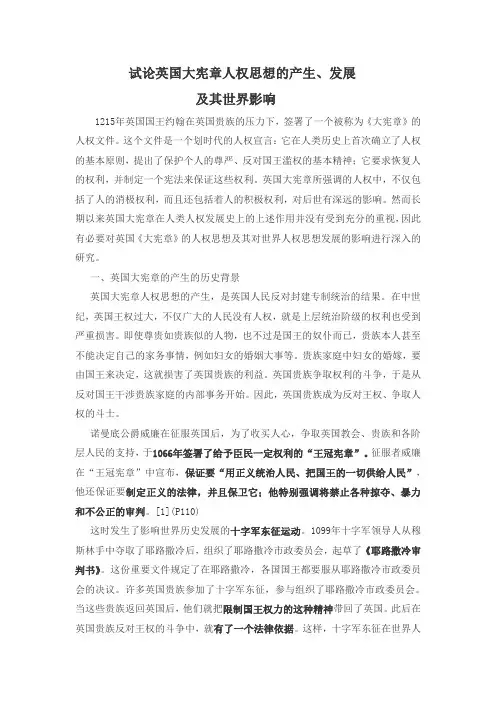
试论英国大宪章人权思想的产生、发展及其世界影响1215年英国国王约翰在英国贵族的压力下,签署了一个被称为《大宪章》的人权文件。
这个文件是一个划时代的人权宣言:它在人类历史上首次确立了人权的基本原则,提出了保护个人的尊严、反对国王滥权的基本精神;它要求恢复人的权利,并制定一个宪法来保证这些权利。
英国大宪章所强调的人权中,不仅包括了人的消极权利,而且还包括着人的积极权利,对后世有深远的影响。
然而长期以来英国大宪章在人类人权发展史上的上述作用并没有受到充分的重视,因此有必要对英国《大宪章》的人权思想及其对世界人权思想发展的影响进行深入的研究。
一、英国大宪章的产生的历史背景英国大宪章人权思想的产生,是英国人民反对封建专制统治的结果。
在中世纪,英国王权过大,不仅广大的人民没有人权,就是上层统治阶级的权利也受到严重损害。
即使尊贵如贵族似的人物,也不过是国王的奴仆而已,贵族本人甚至不能决定自己的家务事情,例如妇女的婚姻大事等。
贵族家庭中妇女的婚嫁,要由国王来决定,这就损害了英国贵族的利益。
英国贵族争取权利的斗争,于是从反对国王干涉贵族家庭的内部事务开始。
因此,英国贵族成为反对王权、争取人权的斗士。
诺曼底公爵威廉在征服英国后,为了收买人心,争取英国教会、贵族和各阶层人民的支持,于1066年签署了给予臣民一定权利的“王冠宪章”。
征服者威廉在“王冠宪章”中宣布,保证要“用正义统治人民、把国王的一切供给人民”,他还保证要制定正义的法律,并且保卫它;他特别强调将禁止各种掠夺、暴力和不公正的审判。
[1](P110)这时发生了影响世界历史发展的十字军东征运动。
1099年十字军领导人从穆斯林手中夺取了耶路撒冷后,组织了耶路撒冷市政委员会,起草了《耶路撒冷审判书》。
这份重要文件规定了在耶路撒冷,各国国王都要服从耶路撒冷市政委员会的决议。
许多英国贵族参加了十字军东征,参与组织了耶路撒冷市政委员会。
当这些贵族返回英国后,他们就把限制国王权力的这种精神带回了英国。
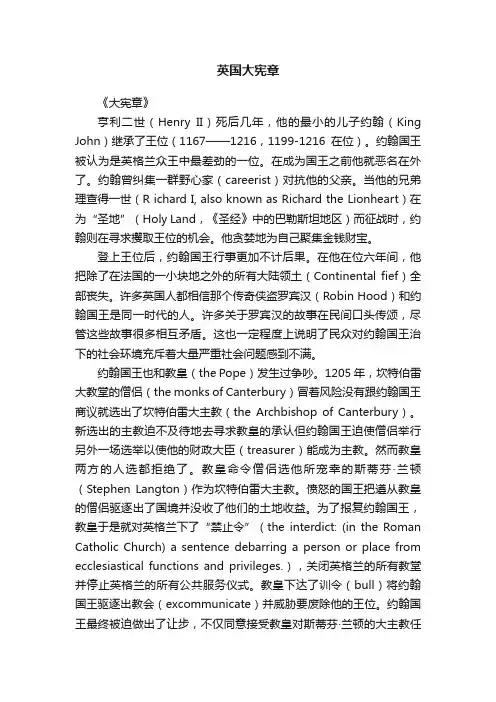
英国大宪章《大宪章》亨利二世(Henry II)死后几年,他的最小的儿子约翰(King John)继承了王位(1167——1216,1199-1216在位)。
约翰国王被认为是英格兰众王中最差劲的一位。
在成为国王之前他就恶名在外了。
约翰曾纠集一群野心家(careerist)对抗他的父亲。
当他的兄弟理查得一世(R ichard I, also known as Richard the Lionheart)在为“圣地”(Holy Land,《圣经》中的巴勒斯坦地区)而征战时,约翰则在寻求攫取王位的机会。
他贪婪地为自己聚集金钱财宝。
登上王位后,约翰国王行事更加不计后果。
在他在位六年间,他把除了在法国的一小块地之外的所有大陆领土(Continental fief)全部丧失。
许多英国人都相信那个传奇侠盗罗宾汉(Robin Hood)和约翰国王是同一时代的人。
许多关于罗宾汉的故事在民间口头传颂,尽管这些故事很多相互矛盾。
这也一定程度上说明了民众对约翰国王治下的社会环境充斥着大量严重社会问题感到不满。
约翰国王也和教皇(the Pope)发生过争吵。
1205年,坎特伯雷大教堂的僧侣(the monks of Canterbury)冒着风险没有跟约翰国王商议就选出了坎特伯雷大主教(the Archbishop of Canterbury)。
新选出的主教迫不及待地去寻求教皇的承认但约翰国王迫使僧侣举行另外一场选举以使他的财政大臣(treasurer)能成为主教。
然而教皇两方的人选都拒绝了。
教皇命令僧侣选他所宠幸的斯蒂芬·兰顿(Stephen Langton)作为坎特伯雷大主教。
愤怒的国王把遵从教皇的僧侣驱逐出了国境并没收了他们的土地收益。
为了报复约翰国王,教皇于是就对英格兰下了“禁止令”(the interdict: (in the Roman Catholic Church) a sentence debarring a person or place from ecclesiastical functions and privileges.),关闭英格兰的所有教堂并停止英格兰的所有公共服务仪式。
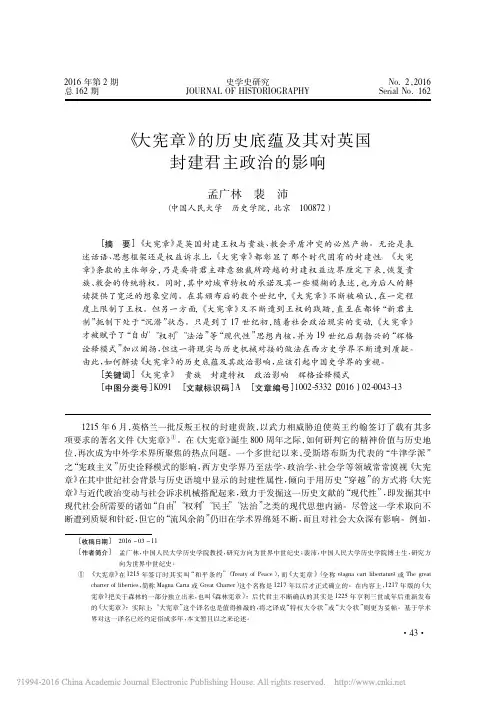
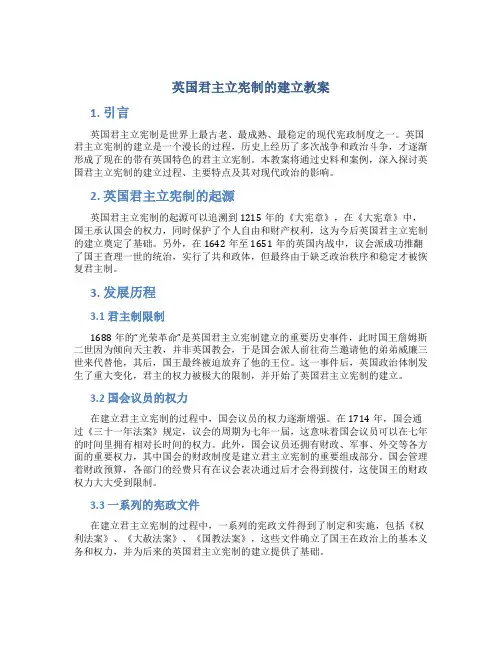
英国君主立宪制的建立教案1. 引言英国君主立宪制是世界上最古老、最成熟、最稳定的现代宪政制度之一。
英国君主立宪制的建立是一个漫长的过程,历史上经历了多次战争和政治斗争,才逐渐形成了现在的带有英国特色的君主立宪制。
本教案将通过史料和案例,深入探讨英国君主立宪制的建立过程、主要特点及其对现代政治的影响。
2. 英国君主立宪制的起源英国君主立宪制的起源可以追溯到1215年的《大宪章》,在《大宪章》中,国王承认国会的权力,同时保护了个人自由和财产权利,这为今后英国君主立宪制的建立奠定了基础。
另外,在1642年至1651年的英国内战中,议会派成功推翻了国王查理一世的统治,实行了共和政体,但最终由于缺乏政治秩序和稳定才被恢复君主制。
3. 发展历程3.1 君主制限制1688年的“光荣革命”是英国君主立宪制建立的重要历史事件,此时国王詹姆斯二世因为倾向天主教,并非英国教会,于是国会派人前往荷兰邀请他的弟弟威廉三世来代替他,其后,国王最终被迫放弃了他的王位。
这一事件后,英国政治体制发生了重大变化,君主的权力被极大的限制,并开始了英国君主立宪制的建立。
3.2 国会议员的权力在建立君主立宪制的过程中,国会议员的权力逐渐增强。
在1714年,国会通过《三十一年法案》规定,议会的周期为七年一届,这意味着国会议员可以在七年的时间里拥有相对长时间的权力。
此外,国会议员还拥有财政、军事、外交等各方面的重要权力,其中国会的财政制度是建立君主立宪制的重要组成部分。
国会管理着财政预算,各部门的经费只有在议会表决通过后才会得到拨付,这使国王的财政权力大大受到限制。
3.3 一系列的宪政文件在建立君主立宪制的过程中,一系列的宪政文件得到了制定和实施,包括《权利法案》、《大赦法案》、《国教法案》,这些文件确立了国王在政治上的基本义务和权力,并为后来的英国君主立宪制的建立提供了基础。
4. 特点4.1 合法实体英国君主立宪制的核心特点是君主制度与立宪制度的有机结合,使君主制成为合法的实体。
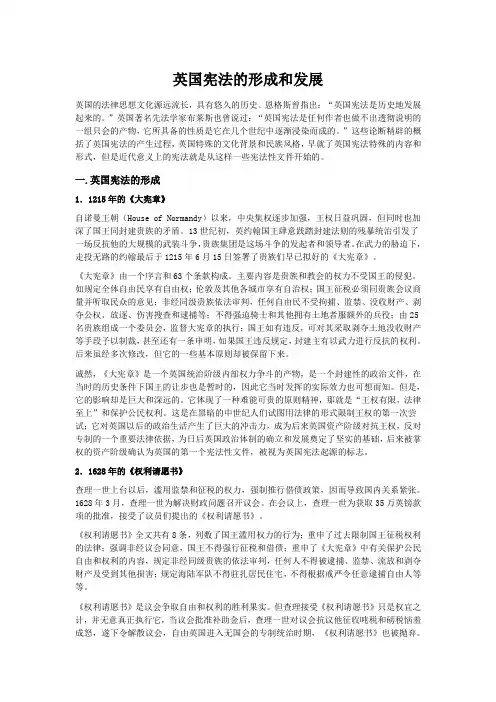
英国宪法的形成和发展英国的法律思想文化源远流长,具有悠久的历史。
恩格斯曾指出:“英国宪法是历史地发展起来的。
”英国著名先法学家布莱斯也曾说过:“英国宪法是任何作者也做不出透彻说明的一组只会的产物,它所具备的性质是它在几个世纪中逐渐浸染而成的。
”这些论断精辟的概括了英国宪法的产生过程,英国特殊的文化背景和民族风格,早就了英国宪法特殊的内容和形式,但是近代意义上的宪法就是从这样一些宪法性文件开始的。
一.英国宪法的形成1.1215年的《大宪章》自诺曼王朝(House of Normandy)以来,中央集权逐步加强,王权日益巩固,但同时也加深了国王同封建贵族的矛盾。
13世纪初,英约翰国王肆意践踏封建法则的残暴统治引发了一场反抗他的大规模的武装斗争,贵族集团是这场斗争的发起者和领导者。
在武力的胁迫下,走投无路的约翰最后于1215年6月15日签署了贵族们早已拟好的《大宪章》。
《大宪章》由一个序言和63个条款构成。
主要内容是贵族和教会的权力不受国王的侵犯。
如规定全体自由民享有自由权;伦敦及其他各城市享有自治权;国王征税必须同贵族会议商量并听取民众的意见;非经同级贵族依法审判,任何自由民不受拘捕、监禁、没收财产、剥夺公权、放逐、伤害搜查和逮捕等;不得强迫骑士和其他拥有土地者服额外的兵役;由25名贵族组成一个委员会,监督大宪章的执行;国王如有违反,可对其采取剥夺土地没收财产等手段予以制裁,甚至还有一条申明,如果国王违反规定,封建主有以武力进行反抗的权利。
后来虽经多次修改,但它的一些基本原则却被保留下来。
诚然,《大宪章》是一个英国统治阶级内部权力争斗的产物,是一个封建性的政治文件,在当时的历史条件下国王的让步也是暂时的,因此它当时发挥的实际效力也可想而知。
但是,它的影响却是巨大和深远的。
它体现了一种难能可贵的原则精神,那就是“王权有限,法律至上”和保护公民权利。
这是在黑暗的中世纪人们试图用法律的形式限制王权的第一次尝试;它对英国以后的政治生活产生了巨大的冲击力,成为后来英国资产阶级对抗王权,反对专制的一个重要法律依据,为日后英国政治体制的确立和发展奠定了坚实的基础,后来被掌权的资产阶级确认为英国的第一个宪法性文件,被视为英国宪法起源的标志。
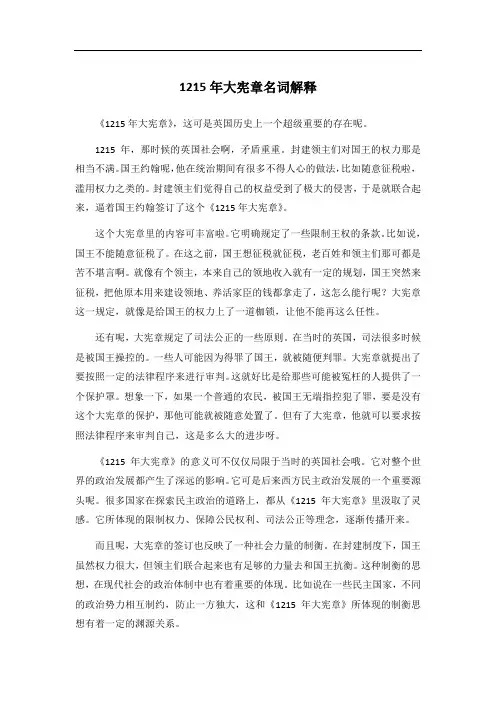
1215年大宪章名词解释《1215年大宪章》,这可是英国历史上一个超级重要的存在呢。
1215年,那时候的英国社会啊,矛盾重重。
封建领主们对国王的权力那是相当不满。
国王约翰呢,他在统治期间有很多不得人心的做法,比如随意征税啦,滥用权力之类的。
封建领主们觉得自己的权益受到了极大的侵害,于是就联合起来,逼着国王约翰签订了这个《1215年大宪章》。
这个大宪章里的内容可丰富啦。
它明确规定了一些限制王权的条款。
比如说,国王不能随意征税了。
在这之前,国王想征税就征税,老百姓和领主们那可都是苦不堪言啊。
就像有个领主,本来自己的领地收入就有一定的规划,国王突然来征税,把他原本用来建设领地、养活家臣的钱都拿走了,这怎么能行呢?大宪章这一规定,就像是给国王的权力上了一道枷锁,让他不能再这么任性。
还有呢,大宪章规定了司法公正的一些原则。
在当时的英国,司法很多时候是被国王操控的。
一些人可能因为得罪了国王,就被随便判罪。
大宪章就提出了要按照一定的法律程序来进行审判。
这就好比是给那些可能被冤枉的人提供了一个保护罩。
想象一下,如果一个普通的农民,被国王无端指控犯了罪,要是没有这个大宪章的保护,那他可能就被随意处置了。
但有了大宪章,他就可以要求按照法律程序来审判自己,这是多么大的进步呀。
《1215年大宪章》的意义可不仅仅局限于当时的英国社会哦。
它对整个世界的政治发展都产生了深远的影响。
它可是后来西方民主政治发展的一个重要源头呢。
很多国家在探索民主政治的道路上,都从《1215年大宪章》里汲取了灵感。
它所体现的限制权力、保障公民权利、司法公正等理念,逐渐传播开来。
而且呢,大宪章的签订也反映了一种社会力量的制衡。
在封建制度下,国王虽然权力很大,但领主们联合起来也有足够的力量去和国王抗衡。
这种制衡的思想,在现代社会的政治体制中也有着重要的体现。
比如说在一些民主国家,不同的政治势力相互制约,防止一方独大,这和《1215年大宪章》所体现的制衡思想有着一定的渊源关系。
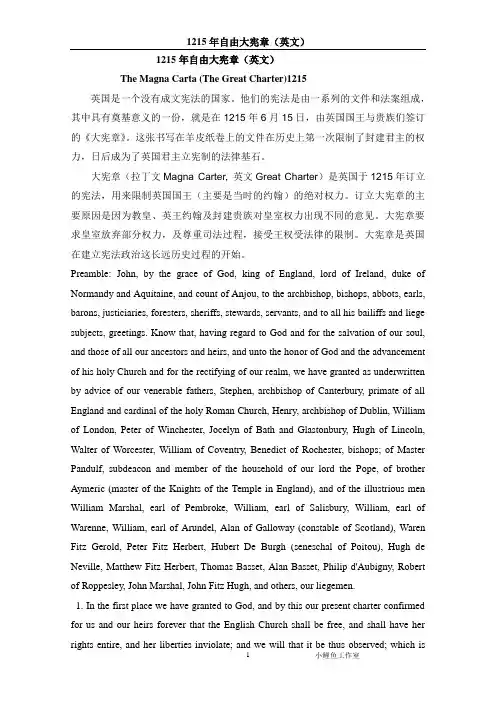
1215年自由大宪章(英文)The Magna Carta (The Great Charter)1215英国是一个没有成文宪法的国家。
他们的宪法是由一系列的文件和法案组成,其中具有奠基意义的一份,就是在1215年6月15日,由英国国王与贵族们签订的《大宪章》。
这张书写在羊皮纸卷上的文件在历史上第一次限制了封建君主的权力,日后成为了英国君主立宪制的法律基石。
大宪章(拉丁文Magna Carter, 英文Great Charter)是英国于1215年订立的宪法,用来限制英国国王(主要是当时的约翰)的绝对权力。
订立大宪章的主要原因是因为教皇、英王约翰及封建贵族对皇室权力出现不同的意见。
大宪章要求皇室放弃部分权力,及尊重司法过程,接受王权受法律的限制。
大宪章是英国在建立宪法政治这长远历史过程的开始。
Preamble: John, by the grace of God, king of England, lord of Ireland, duke of Normandy and Aquitaine, and count of Anjou, to the archbishop, bishops, abbots, earls, barons, justiciaries, foresters, sheriffs, stewards, servants, and to all his bailiffs and liege subjects, greetings. Know that, having regard to God and for the salvation of our soul, and those of all our ancestors and heirs, and unto the honor of God and the advancement of his holy Church and for the rectifying of our realm, we have granted as underwritten by advice of our venerable fathers, Stephen, archbishop of Canterbury, primate of all England and cardinal of the holy Roman Church, Henry, archbishop of Dublin, William of London, Peter of Winchester, Jocelyn of Bath and Glastonbury, Hugh of Lincoln, Walter of Worcester, William of Coventry, Benedict of Rochester, bishops; of Master Pandulf, subdeacon and member of the household of our lord the Pope, of brother Aymeric (master of the Knights of the Temple in England), and of the illustrious men William Marshal, earl of Pembroke, William, earl of Salisbury, William, earl of Warenne, William, earl of Arundel, Alan of Galloway (constable of Scotland), Waren Fitz Gerold, Peter Fitz Herbert, Hubert De Burgh (seneschal of Poitou), Hugh de Neville, Matthew Fitz Herbert, Thomas Basset, Alan Basset, Philip d'Aubigny, Robert of Roppesley, John Marshal, John Fitz Hugh, and others, our liegemen.1. In the first place we have granted to God, and by this our present charter confirmed for us and our heirs forever that the English Church shall be free, and shall have her rights entire, and her liberties inviolate; and we will that it be thus observed; which isapparent from this that the freedom of elections, which is reckoned most important and very essential to the English Church, we, of our pure and unconstrained will, did grant, and did by our charter confirm and did obtain the ratification of the same from our lord, Pope Innocent III, before the quarrel arose between us and our barons: and this we will observe, and our will is that it be observed in good faith by our heirs forever. We have also granted to all freemen of our kingdom, for us and our heirs forever, all the underwritten liberties, to be had and held by them and their heirs, of us and our heirs forever.2. If any of our earls or barons, or others holding of us in chief by military service shall have died, and at the time of his death his heir shall be full of age and owe "relief", he shall have his inheritance by the old relief, to wit, the heir or heirs of an earl, for the whole barony of an earl by £100; the heir or heirs of a baron, £100 for a whole barony; the heir or heirs of a knight, 100s, at most, and whoever owes less let him give less, according to the ancient custom of fees.3. If, however, the heir of any one of the aforesaid has been under age and in wardship, let him have his inheritance without relief and without fine when he comes of age.4. The guardian of the land of an heir who is thus under age, shall take from the land of the heir nothing but reasonable produce, reasonable customs, and reasonable services, and that without destruction or waste of men or goods; and if we have committed the wardship of the lands of any such minor to the sheriff, or to any other who is responsible to us for its issues, and he has made destruction or waster of what he holds in wardship, we will take of him amends, and the land shall be committed to two lawful and discreet men of that fee, who shall be responsible for the issues to us or to him to whom we shall assign them; and if we have given or sold the wardship of any such land to anyone and he has therein made destruction or waste, he shall lose that wardship, and it shall be transferred to two lawful and discreet men of that fief, who shall be responsible to us in like manner as aforesaid.5. The guardian, moreover, so long as he has the wardship of the land, shall keep up the houses, parks, fishponds, stanks, mills, and other things pertaining to the land, out of the issues of the same land; and he shall restore to the heir, when he has come to full age, all his land, stocked with ploughs and wainage, according as the season of husbandry shallrequire, and the issues of the land can reasonable bear.6. Heirs shall be married without disparagement, yet so that before the marriage takes place the nearest in blood to that heir shall have notice.7. A widow, after the death of her husband, shall forthwith and without difficulty have her marriage portion and inheritance; nor shall she give anything for her dower, or for her marriage portion, or for the inheritance which her husband and she held on the day of the death of that husband; and she may remain in the house of her husband for forty days after his death, within which time her dower shall be assigned to her.8. No widow shall be compelled to marry, so long as she prefers to live without a husband; provided always that she gives security not to marry without our consent, if she holds of us, or without the consent of the lord of whom she holds, if she holds of another.9. Neither we nor our bailiffs will seize any land or rent for any debt, as long as the chattels of the debtor are sufficient to repay the debt; nor shall the sureties of the debtor be distrained so long as the principal debtor is able to satisfy the debt; and if the principal debtor shall fail to pay the debt, having nothing wherewith to pay it, then the sureties shall answer for the debt; and let them have the lands and rents of the debtor, if they desire them, until they are indemnified for the debt which they have paid for him, unless the principal debtor can show proof that he is discharged thereof as against the said sureties.10. If one who has borrowed from the Jews any sum, great or small, die before that loan be repaid, the debt shall not bear interest while the heir is under age, of whomsoever he may hold; and if the debt fall into our hands, we will not take anything except the principal sum contained in the bond.11. And if anyone die indebted to the Jews, his wife shall have her dower and pay nothing of that debt; and if any children of the deceased are left under age, necessaries shall be provided for them in keeping with the holding of the deceased; and out of the residue the debt shall be paid, reserving, however, service due to feudal lords; in like manner let it be done touching debts due to others than Jews.12. No scutage not aid shall be imposed on our kingdom, unless by common counsel of our kingdom, except for ransoming our person, for making our eldest son a knight, andfor once marrying our eldest daughter; and for these there shall not be levied more than a reasonable aid. In like manner it shall be done concerning aids from the city of London.13. And the city of London shall have all it ancient liberties and free customs, as well by land as by water; furthermore, we decree and grant that all other cities, boroughs, towns, and ports shall have all their liberties and free customs.14. And for obtaining the common counsel of the kingdom anent the assessing of an aid (except in the three cases aforesaid) or of a scutage, we will cause to be summoned the archbishops, bishops, abbots, earls, and greater barons, severally by our letters; and we will moveover cause to be summoned generally, through our sheriffs and bailiffs, and others who hold of us in chief, for a fixed date, namely, after the expiry of at least forty days, and at a fixed place; and in all letters of such summons we will specify the reason of the summons. And when the summons has thus been made, the business shall proceed on the day appointed, according to the counsel of such as are present, although not all who were summoned have come.15. We will not for the future grant to anyone license to take an aid from his own free tenants, except to ransom his person, to make his eldest son a knight, and once to marry his eldest daughter; and on each of these occasions there shall be levied only a reasonable aid.16. No one shall be distrained for performance of greater service for a knight's fee, or for any other free tenement, than is due therefrom.17. Common pleas shall not follow our court, but shall be held in some fixed place.18. Inquests of novel disseisin, of mort d'ancestor, and of darrein presentment shall not be held elsewhere than in their own county courts, and that in manner following; We, or, if we should be out of the realm, our chief justiciar, will send two justiciaries through every county four times a year, who shall alone with four knights of the county chosen by the county, hold the said assizes in the county court, on the day and in the place of meeting of that court.19. And if any of the said assizes cannot be taken on the day of the county court, let there remain of the knights and freeholders, who were present at the county court on that day, as many as may be required for the efficient making of judgments, accordingas the business be more or less.20. A freeman shall not be amerced for a slight offense, except in accordance with the degree of the offense; and for a grave offense he shall be amerced in accordance with the gravity of the offense, yet saving always his "contentment"; and a merchant in the same way, saving his "merchandise"; and a villein shall be amerced in the same way, saving his "wainage" if they have fallen into our mercy: and none of the aforesaid amercements shall be imposed except by the oath of honest men of the neighborhood. 21. Earls and barons shall not be amerced except through their peers, and only in accordance with the degree of the offense.22. A clerk shall not be amerced in respect of his lay holding except after the manner of the others aforesaid; further, he shall not be amerced in accordance with the extent of his ecclesiastical benefice.23. No village or individual shall be compelled to make bridges at river banks, except those who from of old were legally bound to do so.24. No sheriff, constable, coroners, or others of our bailiffs, shall hold pleas of our Crown.25. All counties, hundred, wapentakes, and trithings (except our demesne manors) shall remain at the old rents, and without any additional payment.26. If anyone holding of us a lay fief shall die, and our sheriff or bailiff shall exhibit our letters patent of summons for a debt which the deceased owed us, it shall be lawful for our sheriff or bailiff to attach and enroll the chattels of the deceased, found upon the lay fief, to the value of that debt, at the sight of law worthy men, provided always that nothing whatever be thence removed until the debt which is evident shall be fully paid to us; and the residue shall be left to the executors to fulfill the will of the deceased; and if there be nothing due from him to us, all the chattels shall go to the deceased, saving to his wife and children their reasonable shares.27. If any freeman shall die intestate, his chattels shall be distributed by the hands of his nearest kinsfolk and friends, under supervision of the Church, saving to every one the debts which the deceased owed to him.28. No constable or other bailiff of ours shall take corn or other provisions from anyone without immediately tendering money therefor, unless he can have postponementthereof by permission of the seller.29. No constable shall compel any knight to give money in lieu of castle-guard, when he is willing to perform it in his own person, or (if he himself cannot do it from any reasonable cause) then by another responsible man. Further, if we have led or sent him upon military service, he shall be relieved from guard in proportion to the time during which he has been on service because of us.30. No sheriff or bailiff of ours, or other person, shall take the horses or carts of any freeman for transport duty, against the will of the said freeman.31. Neither we nor our bailiffs shall take, for our castles or for any other work of ours, wood which is not ours, against the will of the owner of that wood.32. We will not retain beyond one year and one day, the lands those who have been convicted of felony, and the lands shall thereafter be handed over to the lords of the fiefs.33. All kydells for the future shall be removed altogether from Thames and Medway, and throughout all England, except upon the seashore.34. The writ which is called praecipe shall not for the future be issued to anyone, regarding any tenement whereby a freeman may lose his court.35. Let there be one measure of wine throughout our whole realm; and one measure of ale; and one measure of corn, to wit, "the London quarter"; and one width of cloth (whether dyed, or russet, or "halberget"), to wit, two ells within the selvedges; of weights also let it be as of measures.36. Nothing in future shall be given or taken for a writ of inquisition of life or limbs, but freely it shall be granted, and never denied.37. If anyone holds of us by fee-farm, either by socage or by burage, or of any other land by knight's service, we will not (by reason of that fee-farm, socage, or burgage), have the wardship of the heir, or of such land of his as if of the fief of that other; nor shall we have wardship of that fee-farm, socage, or burgage, unless such fee-farm owes knight's service. We will not by reason of any small serjeancy which anyone may hold of us by the service of rendering to us knives, arrows, or the like, have wardship of his heir or of the land which he holds of another lord by knight's service.38. No bailiff for the future shall, upon his own unsupported complaint, put anyone tohis "law", without credible witnesses brought for this purposes.39. No freemen shall be taken or imprisoned or disseised or exiled or in any way destroyed, nor will we go upon him nor send upon him, except by the lawful judgment of his peers or by the law of the land.40. To no one will we sell, to no one will we refuse or delay, right or justice.41. All merchants shall have safe and secure exit from England, and entry to England, with the right to tarry there and to move about as well by land as by water, for buying and selling by the ancient and right customs, quit from all evil tolls, except (in time of war) such merchants as are of the land at war with us. And if such are found in our land at the beginning of the war, they shall be detained, without injury to their bodies or goods, until information be received by us, or by our chief justiciar, how the merchants of our land found in the land at war with us are treated; and if our men are safe there, the others shall be safe in our land.42. It shall be lawful in future for anyone (excepting always those imprisoned or outlawed in accordance with the law of the kingdom, and natives of any country at war with us, and merchants, who shall be treated as if above provided) to leave our kingdom and to return, safe and secure by land and water, except for a short period in time of war, on grounds of public policy- reserving always the allegiance due to us.43. If anyone holding of some escheat (such as the honor of Wallingford, Nottingham, Boulogne, Lancaster, or of other escheats which are in our hands and are baronies) shall die, his heir shall give no other relief, and perform no other service to us than he would have done to the baron if that barony had been in the baron's hand; and we shall hold it in the same manner in which the baron held it.44. Men who dwell without the forest need not henceforth come before our justiciaries of the forest upon a general summons, unless they are in plea, or sureties of one or more, who are attached for the forest.45. We will appoint as justices, constables, sheriffs, or bailiffs only such as know the law of the realm and mean to observe it well.46. All barons who have founded abbeys, concerning which they hold charters from the kings of England, or of which they have long continued possession, shall have the wardship of them, when vacant, as they ought to have.47. All forests that have been made such in our time shall forthwith be disafforsted; anda similar course shall be followed with regard to river banks that have been placed "in defense" by us in our time.48. All evil customs connected with forests and warrens, foresters and warreners, sheriffs and their officers, river banks and their wardens, shall immediately by inquired into in each county by twelve sworn knights of the same county chosen by the honest men of the same county, and shall, within forty days of the said inquest, be utterly abolished, so as never to be restored, provided always that we previously have intimation thereof, or our justiciar, if we should not be in England.49. We will immediately restore all hostages and charters delivered to us by Englishmen, as sureties of the peace of faithful service.50. We will entirely remove from their bailiwicks, the relations of Gerard of Athee (so that in future they shall have no bailiwick in England); namely, Engelard of Cigogne, Peter, Guy, and Andrew of Chanceaux, Guy of Cigogne, Geoffrey of Martigny with his brothers, Philip Mark with his brothers and his nephew Geoffrey, and the whole brood of the same.51. As soon as peace is restored, we will banish from the kingdom all foreign born knights, crossbowmen, serjeants, and mercenary soldiers who have come with horses and arms to the kingdom's hurt.52. If anyone has been dispossessed or removed by us, without the legal judgment of his peers, from his lands, castles, franchises, or from his right, we will immediately restore them to him; and if a dispute arise over this, then let it be decided by the five and twenty barons of whom mention is made below in the clause for securing the peace. Moreover, for all those possessions, from which anyone has, without the lawful judgment of his peers, been disseised or removed, by our father, King Henry, or by our brother, King Richard, and which we retain in our hand (or which as possessed by others, to whom we are bound to warrant them) we shall have respite until the usual term of crusaders; excepting those things about which a plea has been raised, or an inquest made by our order, before our taking of the cross; but as soon as we return from the expedition, we will immediately grant full justice therein.53. We shall have, moreover, the same respite and in the same manner in rendering justice concerning the disafforestation or retention of those forests which Henry our father and Richard our broter afforested, and concerning the wardship of lands which are of the fief of another (namely, such wardships as we have hitherto had by reason of a fief which anyone held of us by knight's service), and concerning abbeys founded on other fiefs than our own, in which the lord of the fee claims to have right; and when we have returned, or if we desist from our expedition, we will immediately grant full justice to all who complain of such things.54. No one shall be arrested or imprisoned upon the appeal of a woman, for the death of any other than her husband.55. All fines made with us unjustly and against the law of the land, and all amercements, imposed unjustly and against the law of the land, shall be entirely remitted, or else it shall be done concerning them according to the decision of the five and twenty barons whom mention is made below in the clause for securing the pease, or according to the judgment of the majority of the same, along with the aforesaid Stephen, archbishop of Canterbury, if he can be present, and such others as he may wish to bring with him for this purpose, and if he cannot be present the business shall nevertheless proceed without him, provided always that if any one or more of the aforesaid five and twenty barons are in a similar suit, they shall be removed as far as concerns this particular judgment, others being substituted in their places after having been selected by the rest of the same five and twenty for this purpose only, and after having been sworn.56. If we have disseised or removed Welshmen from lands or liberties, or other things, without the legal judgment of their peers in England or in Wales, they shall be immediately restored to them; and if a dispute arise over this, then let it be decided in the marches by the judgment of their peers; for the tenements in England according to the law of England, for tenements in Wales according to the law of Wales, and for tenements in the marches according to the law of the marches. Welshmen shall do the same to us and ours.57. Further, for all those possessions from which any Welshman has, without the lawful judgment of his peers, been disseised or removed by King Henry our father, or King Richard our brother, and which we retain in our hand (or which are possessed by others,and which we ought to warrant), we will have respite until the usual term of crusaders; excepting those things about which a plea has been raised or an inquest made by our order before we took the cross; but as soon as we return (or if perchance we desist from our expedition), we will immediately grant full justice in accordance with the laws of the Welsh and in relation to the foresaid regions.58. We will immediately give up the son of Llywelyn and all the hostages of Wales, and the charters delivered to us as security for the peace.59. We will do towards Alexander, king of Scots, concerning the return of his sisters and his hostages, and concerning his franchises, and his right, in the same manner as we shall do towards our owher barons of England, unless it ought to be otherwise according to the charters which we hold from William his father, formerly king of Scots; and this shall be according to the judgment of his peers in our court.60. Moreover, all these aforesaid customs and liberties, the observances of which we have granted in our kingdom as far as pertains to us towards our men, shall be observed b all of our kingdom, as well clergy as laymen, as far as pertains to them towards their men.61. Since, moveover, for God and the amendment of our kingdom and for the better allaying of the quarrel that has arisen between us and our barons, we have granted all these concessions, desirous that they should enjoy them in complete and firm endurance forever, we give and grant to them the underwritten security, namely, that the barons choose five and twenty barons of the kingdom, whomsoever they will, who shall be bound with all their might, to observe and hold, and cause to be observed, the peace and liberties we have granted and confirmed to them by this our present Charter, so that if we, or our justiciar, or our bailiffs or any one of our officers, shall in anything be at fault towards anyone, or shall have broken any one of the articles of this peace or of this security, and the offense be notified to four barons of the foresaid five and twenty, the said four barons shall repair to us (or our justiciar, if we are out of the realm) and, laying the transgression before us, petition to have that transgression redressed without delay. And if we shall not have corrected the transgression (or, in the event of our being out of the realm, if our justiciar shall not have corrected it) within forty days, reckoning from the time it has been intimated to us (or to our justiciar, if we should be out of the realm),the four barons aforesaid shall refer that matter to the rest of the five and twenty barons, and those five and twenty barons shall, together with the community of the whole realm, distrain and distress us in all possible ways, namely, by seizing our castles, lands, possessions, and in any other way they can, until redress has been obtained as they deem fit, saving harmless our own person, and the persons of our queen and children; and when redress has been obtained, they shall resume their old relations towards us. And let whoever in the country desires it, swear to obey the orders of the said five and twenty barons for the execution of all the aforesaid matters, and along with them, to molest us to the utmost of his power; and we publicly and freely grant leave to everyone who wishes to swear, and we shall never forbid anyone to swear. All those, moveover, in the land who of themselves and of their own accord are unwilling to swear to the twenty five to help them in constraining and molesting us, we shall by our command compel the same to swear to the effect foresaid. And if any one of the five and twenty barons shall have died or departed from the land, or be incapacitated in any other manner which would prevent the foresaid provisions being carried out, those of the said twenty five barons who are left shall choose another in his place according to their own judgment, and he shall be sworn in the same way as the others. Further, in all matters, the execution of which is entrusted,to these twenty five barons, if perchance these twenty five are present and disagree about anything, or if some of them, after being summoned, are unwilling or unable to be present, that which the majority of those present ordain or command shall be held as fixed and established, exactly as if the whole twenty five had concurred in this; and the said twenty five shall swear that they will faithfully observe all that is aforesaid, and cause it to be observed with all their might. And we shall procure nothing from anyone, directly or indirectly, whereby any part of these concessions and liberties might be revoked or diminished; and if any such things has been procured, let it be void and null, and we shall never use it personally or by another.62. And all the will, hatreds, and bitterness that have arisen between us and our men, clergy and lay, from the date of the quarrel, we have completely remitted and pardoned to everyone. Moreover, all trespasses occasioned by the said quarrel, from Easter in the sixteenth year of our reign till the restoration of peace, we have fully remitted to all,both clergy and laymen, and completely forgiven, as far as pertains to us. And on this head, we have caused to be made for them letters testimonial patent of the lord Stephen, archbishop of Canterbury, of the lord Henry, archbishop of Dublin, of the bishops aforesaid, and of Master Pandulf as touching this security and the concessions aforesaid.63. Wherefore we will and firmly order that the English Church be free, and that the men in our kingdom have and hold all the aforesaid liberties, rights, and concessions, well and peaceably, freely and quietly, fully and wholly, for themselves and their heirs, of us and our heirs, in all respects and in all places forever, as is aforesaid. An oath, moreover, has been taken, as well on our part as on the art of the barons, that all these conditions aforesaid shall be kept in good faith and without evil intent.Given under our hand - the above named and many others being witnesses - in the meadow which is called Runnymede, between Windsor and Staines, on the fifteenth day of June, in the seventeenth year of our reign.。
![[整理版]1215英国大宪章](https://uimg.taocdn.com/46f74691bdeb19e8b8f67c1cfad6195f312be868.webp)
1215英国大宪章受命于天的英格兰国王兼领爱尔兰宗主,诺曼第与阿奎丹公爵、安茹伯爵约翰,谨向大主教,主教,住持,伯爵,男爵,法官,森林宫,执行吏,典狱官,差人,及其管家吏与忠颇的人民致候。
由于可敬的神父们,坎特伯里大主教,英格兰大主教兼圣罗马教会红衣主教斯提芬;杜伯林大主教亨利……暨培姆布卢克大司仪伯爵威廉;索斯伯利伯爵威廉……等贵族,及其他忠顺臣民谏议,使余等知道,为了余等自身以及余等之先人与后代灵魂的安全,同时也为了圣教会的昌盛和王国的兴隆,上帝的意旨使余等承认下列诸端,并昭告全国:(1) 首先,余等及余等之后嗣坚决应许上帝,根据本宪章,英国教会当享有自由,其权利将不受干扰,其自由将不受侵犯。
关于英格兰教会所视为最重要与最必需之自由选举,在余等与诸男爵发生不睦之前曾自动地或按照己意用特许状所颁赐者,一一同时经余等请得教王英诺森三世所同意者一一余等及余等之世代子孙当永以善意遵守。
此外,余等及余等之子孙后代,同时亦以下面附列之各项自由给予余等王国内一切自由人民,并允许严行遵守,永矢勿渝。
(2) 任何伯爵或男爵,或因军役而自余等直接领有采地之人身故时,如有已达成年之继承者,于按照旧时数额缴纳承继税后,即可享有其遗产。
计伯爵继承人于缴纳一百镑后,即可享受伯爵全部遗产;另爵继承人于缴纳一百镑后,即可事受男爵全部遗产;武士继承人于最多缴纳一百先令后,即可享受全部武士封地。
其他均应按照采地旧有习惯,应少交者须少交。
(3)上述诸人之继承人如未达成年,须受监护者,应于成年后以其遗产交付之,不得收取任何继承税或产业转移税。
(4) 凡经管前款所述未达成年之继承人之土地者,除自该项土地上收取适当数量之产品,及按照习惯应行征取之赋税与力役外,不得多有需索以免耗费人力与物力。
如余等以该项土地之监护权委托执行吏或其他人等,侮对其收益向余等负责,而其人使所保管之财产遭受浪费与损毁时,余等将处此人以罚金,并将该项土地转交该采地中合法与端正之人士二人,傅对该项收益能向余等或余等所指定之人负责。
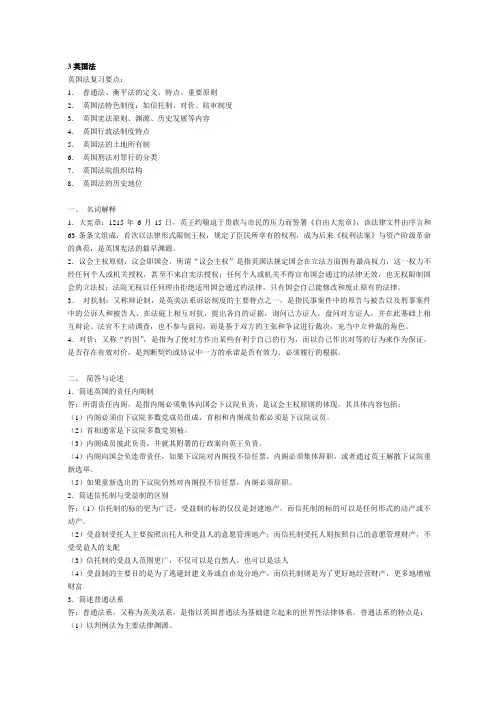
3英国法英国法复习要点:1.普通法、衡平法的定义、特点、重要原则2.英国法特色制度:如信托制、对价、陪审制度3.英国宪法原则、渊源、历史发展等内容4.英国行政法制度特点5.英国法的土地所有制6.英国刑法对罪行的分类7.英国法院组织结构8.英国法的历史地位一、名词解释1.大宪章:1215年6月15日,英王约翰迫于贵族与市民的压力而签署《自由大宪章》,该法律文件由序言和63条条文组成,首次以法律形式限制王权,规定了臣民所享有的权利,成为后来《权利法案》与资产阶级革命的典范,是英国宪法的最早渊源。
2.议会主权原则:议会即国会,所谓“议会主权”是指英国法规定国会在立法方面拥有最高权力,这一权力不经任何个人或机关授权,甚至不来自宪法授权;任何个人或机关不得宣布国会通过的法律无效,也无权限制国会的立法权;法院无权以任何理由拒绝适用国会通过的法律,只有国会自己能修改和废止原有的法律。
3.对抗制:又称辩论制,是英美法系诉讼制度的主要特点之一,是指民事案件中的原告与被告以及刑事案件中的公诉人和被告人,在法庭上相互对抗,提出各自的证据,询问己方证人,盘问对方证人,并在此基础上相互辩论。
法官不主动调查,也不参与盘问,而是基于双方的主张和争议进行裁决,充当中立仲裁的角色。
4.对价:又称“约因”,是指为了使对方作出某些有利于自己的行为,而以自己作出对等的行为来作为保证。
是否存在有效对价,是判断契约或协议中一方的承诺是否有效力、必须履行的根据。
二、简答与论述1.简述英国的责任内阁制答:所谓责任内阁,是指内阁必须集体向国会下议院负责,是议会主权原则的体现。
其具体内容包括:(1)内阁必须由下议院多数党成员组成,首相和内阁成员都必须是下议院议员。
(2)首相通常是下议院多数党领袖。
(3)内阁成员彼此负责,并就其附署的行政案向英王负责。
(4)内阁向国会负连带责任,如果下议院对内阁投不信任票,内阁必须集体辞职,或者通过英王解散下议院重新选举。
大宪章
1215年的大宪章以法律限制了英国王室的绝对权力。
大宪章(拉丁文:Magna Carta,英文:The Great Charter)是英国于1215年订立的宪法,用来限制英国国王(主要是针对当时的约翰)的绝对权力。
订立大宪章的主因是教皇、英王约翰及封建贵族对王室权力出现意见分歧。
大宪章要求王室放弃部分权力,尊重司法过程,接受王权受法律的限制。
大宪章是英国在建立宪法政治这长远历史过程的开始。
然而例如1509年上任的英国国王亨利八世随意杀害贵族和后妃,之后的玛丽一世杀害许多新教徒,接下来的伊丽莎白一世又处死贵族表亲,当时各地法官也由国王和贵族指派,可见大宪章并未被确实遵守。
目录
[隐藏]
1历史
2 1215年的大宪章
3影响
4参考资料
[编辑]历史
诺曼人于1066年开始入侵英格兰,在诺曼人成为英国的国王后,于十一及十二世纪逐渐强大。
他们建立的集权政府,加上本地盎格鲁-撒克逊人原来的统治方法,还有盎格鲁人和诺曼人在诺曼底所拥有的土地,使英国国王在1199年成为欧洲最有权力国王。
当英王约翰在十三世纪初即位之后,一连串的事件却令英格兰的封建贵族起来反抗他,并要求限制绝对的王权。
当时英王约翰受到的压力来自三方面:首先是他夺得王位的手法遭人非议,前任英王狮心王理查在1199年死后无子,出现两名继承人,即理查的侄子亚瑟,和理查的弟弟约翰。
约翰将他的对手,亦即他的侄子不列塔尼的亚瑟囚禁,之后亚瑟便失去音讯。
很多人认为约翰是将他的亲人暗杀以取得王位。
第二,约翰与教皇就坎特伯雷大主教的任命产生争执,于是教庭向英格兰施以绝罚,约翰被迫于1213年向教皇屈服。
第三,当时法国国王占领了英国在诺曼底大部份的土地,英国的贵族要求国王夺回领土,约翰即在1214年发动对法国作战,却遭逢大败。
1215年6月10日,英格兰的封建贵族在伦敦聚集,挟持英格兰国王约翰。
约翰被迫赞成贵族提出的“男爵法案”(Articles of the Barons)。
同年6月15日,约翰在兰尼美德(RunnyMede)为法案盖上王室的盖章,贵族在4日后(6月19日)重申效忠约翰。
最后王室秘书将国王与贵族间的协议正式登录,即成为最初的大宪章,并将副本抄送至各地,由指定的王室官员及主教保存。
1215年的大宪章中,最为重要的条文是第六十一条,即所谓“安全法”。
根据该条的规定,由二十五名贵族组成的委员会有权随时召开会议,具有否决国王命令的权力;并且可以使用武力,占据国王的城堡和财产。
这种权力是出自中古时期的一种法律程序,但加之于国王却是史无前例。
英王约翰根本无接受大宪章约束的诚意,他是在武力之下才被迫在文件上签署,特别是第六十一条几乎褫夺了国王所有的权力。
就在贵族离开伦敦各自返回封地之后,约翰立即宣布废弃大宪章,教皇英诺森三世亦训斥大宪章为“以武力及恐惧,强加于国王的无耻条款”,教皇否定了任何贵族对权力的要求,又称这样做破坏了国王的尊严,英国旋即陷入内战。
约翰在1216年10月18日,当内战正酣时病死,九岁的亨利三世即位,王室人员希望年幼的新王会为贵族所接受。
新王即位后,战事终结。
10月12日,王室大臣以亨利的名义再发出大宪章,但当中部分条款,包括第六十一条都被删去。
之后于1217年和1225年,亨利三世都曾再次发布大宪章。
1225年的一次由十八岁的亨利亲自发出,并删除至只有三十七条。
亨利三世统治五十六年后,在1272年逝世。
他逝世时,大宪章已成为既定的英国法律,日后的国王亦难以像约翰一样将它完全推翻。
亨利三世的儿子,
爱德华一世在1297年10月12日发布最后一次修订的大宪章,作为“肯定法案”的一部分。
[编辑]1215年的大宪章
1215年的大宪章确立了一些英国平民享有的政治权利与自由,亦保障了教会不受国王的控制;同时改革了法律和司法,限制了国王及王室官员的行为。
宪章内大部分的内容是从亨利一世时所颁布的自由宪章(Charter of Liberties)抄写过来。
自由宪章是亨利一世1100年加冕时颁布,它限制了国王对如何对待教会及贵族,基本上给予了教会及贵族一定的权利。
最初的大宪章有六十三条条款,当中大部分是针对十三世纪当时的状况而订,例如限制王室狩猎范围等等。
而当中影响最为深远的是第三十九条,由它衍生了人身保护的概念:除非经过由普通法官进行的法律审判,或是根据法律行事;否则任何自由的人,不应被拘留或囚禁、或被夺去财产、被放逐或被杀害。
根据这个条文的规定,国王若要审判任何一个人,只能依据法律;而不能以他的私人喜好来进行。
王权因而受到了限制,是迈向君主立宪的第一步。
[编辑]影响
虽然第一次发布的大宪章只维持了数星期,但是约翰死后的多次重新发布,使它成为了永久的法律;大宪章亦成为了日后英国宪法的基石。
之后亨利三世及他的继承人曾多次避开破坏大宪章的规定,但事实上中世纪英国王室的王权在大宪章之下,仍然是有增无减。
不过,中世纪时期的英国国王亦曾三十次重新发布大宪章,证明国王始终不能忽视它的存在,然而实际上大宪章发布之后大多数英国国王并不遵守,这也是英国没有成文宪法的原因。
到了十七世纪,随着国王与国会之间争执的增加,大宪章的作用亦变得更为重要。
根据宪章的内容多次修订而成的法律,保障更多的权利和涵盖更多的人民,最后演化成现代的君主立宪。
虽然只有开始的数句、中间三条条文以及结束语仍然有效,其余三十四条都已被废除,1297年发布的大宪章至今仍是英国法律的一部分。
今天,大宪章的实际法律效用已很微小,只在司法过程中偶而被控辩双方和法官引用。
但不少日后编成的政府宪法,包括美国宪法,都是
起源自大宪章。
以前每次英王发布大宪章,都会抄送多份到各地,这些抄本部分被带到北美殖民地,保存至今。
1215年约翰签署的第一份大宪章并未被保存下来,只有四份同时期的抄本现仍分别存放在英国的国家图书馆、林肯大教堂和萨士巴利大教堂,另外还有13份1297年以前的大宪章现也仍被保存。
1952年,澳大利亚政府以12,500英镑购得一份1297年的大宪章,放在首都堪培拉的国会展览,美国富商佩里(Ross Perot)亦于1984年购得一份1297年的大宪章,现放在首都华盛顿国家资料馆,与独立宣言及美国宪法一同展出。
[编辑]参考资料
维基文库中相关的原始文献:
大宪章
1215年大宪章翻译文——辅仁大学副教授雷敦和(Edmund Ryden)先生释译Article from Australia's Parliament House about the relevance of MagnaCarta
Holt,J.C.(1992年).MagnaCarta.Cambridge:CambridgeUniversityPress.ISBN 0-521-27778-7.
Jennings:Magna Carta and its influence in the world today
H. Butterfield;Magna Carta in the Historiography of the 16th and 17thCenturies
G.R.C. Davis;Magna Carta
J.C. Dickinson;The Great Charter
G.B. Adams;Constitutional History of England
A. Pallister;Magna Carta the Legacy of Liberty
A. Lyon;Constitutional History of the United Kingdom
G. Williams and J. Ramsden;Ruling Britannia, A Political History ofBritain 1688-1988。